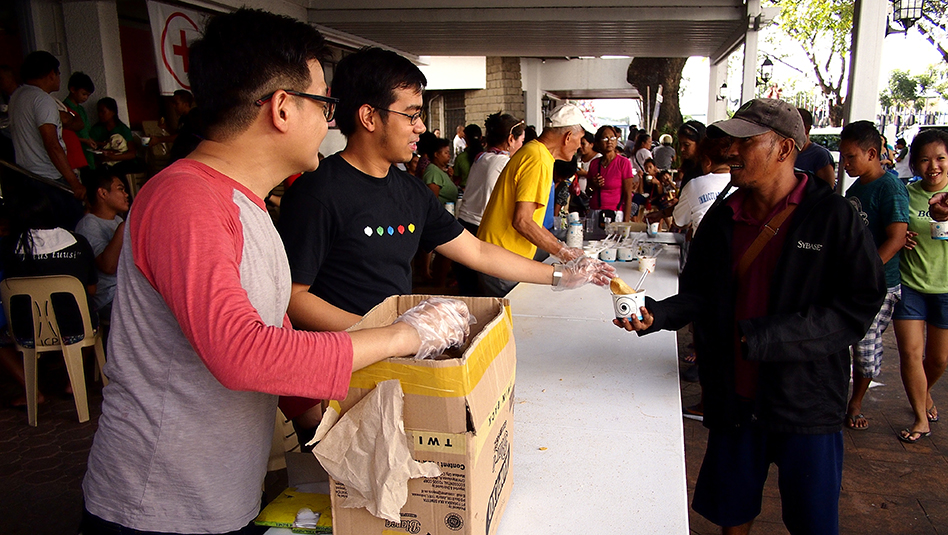Is your standard of living commensurate with your standard of giving?
Should you give more? Give less? Or should you give at all? As we welcome the new year and think of meaningful things to do, Peter Singer, a philosopher, offers some suggestions, along with arguments to give more.

Imagine a small child, a boy, trying to cross a street. He’s oblivious of the oncoming 18-wheeler truck, whose driver was distracted by a message on his mobile phone and didn’t see the child.
You are just a few feet away from the child and could grab him by his shirt to save him. Would you save the child?
You probably would. No sweat. Doing so would take only a few seconds. You wouldn’t ruin your outfit or derail your busy schedule. Besides, saving the child when you have the power to do so, even if you’re not related to him, feels right.
A similar situation was presented by Peter Singer, a philosopher and the founder of effective altruism, in his book The Life You Can Save, which was published in 2010.
He argues that there seems to be a disconnect when we think of it this way: Consider the cost of your favorite drink at a coffee shop. The cost of that drink could save a child living in dire poverty somewhere in Africa or in some impoverished area in the Philippines. If you just donate that amount.
And yet, few of us do it. Those who give think of giving as something they do when they have enough. Some think we’re giving too much.
Basic argument
Here is Singer’s basic argument, verbatim:
First premise: Suffering and death from lack of food, shelter, and medical care are bad.
Second premise: If it is in your power to prevent something bad from happening, without sacrificing anything nearly as important, it is wrong not to do so.
Third premise: By donating to aid agencies, you can prevent suffering and death from lack of food, shelter, and medical care, without sacrificing anything nearly as important.
Conclusion: Therefore, if you do not donate to aid agencies, you are doing something wrong.
Of course, we can think of objections to such a conclusion. Then again, ancient values, as pointed by Singer, have endured through millennia. For Christians, giving “is not a matter of charity, but of our duty and their rights.”
“The Hebrew word for ‘charity,’ tzedakah, simply means ‘justice’ and, as this suggests, for Jews, giving to the poor is no optional extra but an essential part of living a just life,” said Singer.
Muslims are required to give zakat in proportion to their assets.There is also sadaqa, which is optional and includes both money and labor.
Objections
Some objections are worth mentioning here.
Some say there is no black and white and that people are entitled to their own beliefs about giving.
For Singer, that is “moral relativism, a position that many find attractive only until they are faced with someone who is doing something really, really wrong.”
“We can and do try to stop people who are cruel to animals, just as we stop rapists, racists, and terrorists. I’m not saying that failing to give is like committing these acts of violence, but if we reject moral relativism in some situations, then we should reject it everywhere,” he said.
To paraphrase another argument: We may be responsible for the evils that we directly inflict on others, but there is no plausible argument that we owe something to those to whom we have done nothing wrong.
“At first glance, it seems perfectly reasonable. Yet there is a callous side to a philosophy that denies that we have any responsibilities to those who, through no fault of their own, are in need,” said Singer.
If we think this way, then probably we should abolish all those programs to help the poor, the jobless, and the oppressed since, after all, we have done them no harm.
The argument also doesn’t hold up if we consider climate change and the countries who caused much of the global warming. When we use products or benefit from schemes that benefit us despite the unethical practices behind them, we cause injustice unknowingly.
Here’s another one: Giving makes the world a better place, but “it is like a little kid buying a pack of candy, keeping one piece, and giving the rest away. It just doesn’t happen.”
That’s precisely the behavior that we want to change. What we do or how we behave is different from what we ought to do.
Strengthening the case for generosity
A 2021 report by Oxfam, a group of 21 charitable organizations, found that the 10 richest men in the world have more than the combined wealth of the bottom 3.1 billion people. Their wealth doubled during the pandemic.
Credit Suisse, in its Global Wealth Report 2021, said that the richest adult population, comprising 1.1%,owns 45.8% of the world’s total wealth, an increase of 4.8% from 2013. As for the bottom half, they own only 1.3% of the total wealth, a decrease of 1.7%.Talk about the rich getting richer and the poor getting poorer.
The World Bank, in a report titled “Overcoming Poverty and Inequality in the Philippines: Past, Present, and Prospects for the Future”, released in November 2022, said that while poverty fell from 49.2 percent in 1985 to 16.7 percent in 2018, inequality is still high. Approximately 17 percent of national income belongs to just 1 percent of earners, and 14 percent of income is shared by the bottom 50 percent.
What you can do
If you feel compelled to give, here are some steps you can take based on Singer’s suggestions:
- Check out www.TheLifeYouCanSave.com to find out more about effective altruism and which organizations have the most impact on the poor. You can also buy his book.
- Get a list of charitable organizations in the Philippines, do your research, and find an organization to support.
- Get your income tax return or an accounting of your assets and decide how much to give—whether it’s 1%, 5%, or 10% or more of your income or assets—and set how often you would like to give.
- Tell your friends about what you’re doing and try to convince them to give more, too.
What’s in it for you?
For a start, giving will make you happy or happier. A survey from the Social Community Benchmark Survey in the US revealed that those who gave to charity were 43 percent more likely to be “very happy” compared to those who were tightfisted.
Another study, the University of Michigan’s Panel Study of Income Dynamics, showed that those who give are 68 percent less likely to feel “hopeless” and also 34 percent less likely to be “so sad that nothing could cheer them up.”
Making money may make you happy. Giving more, however, may make you even happier, without necessarily making you feel poor.
Besides, you wouldn’t want that truck to run over the child, would you?
ANTHONY O. ALCANTARA is the editor-in-chief of Wealth Insights. He has over 20 years of experience in corporate communications and has a master’s degree in technology management from the University of the Philippines. When not at work, he goes out on epic adventures with his family, practices Aikido, and sings in a church choir.







 DOWNLOAD
DOWNLOAD




 By Anthony O. Alcantara
By Anthony O. Alcantara